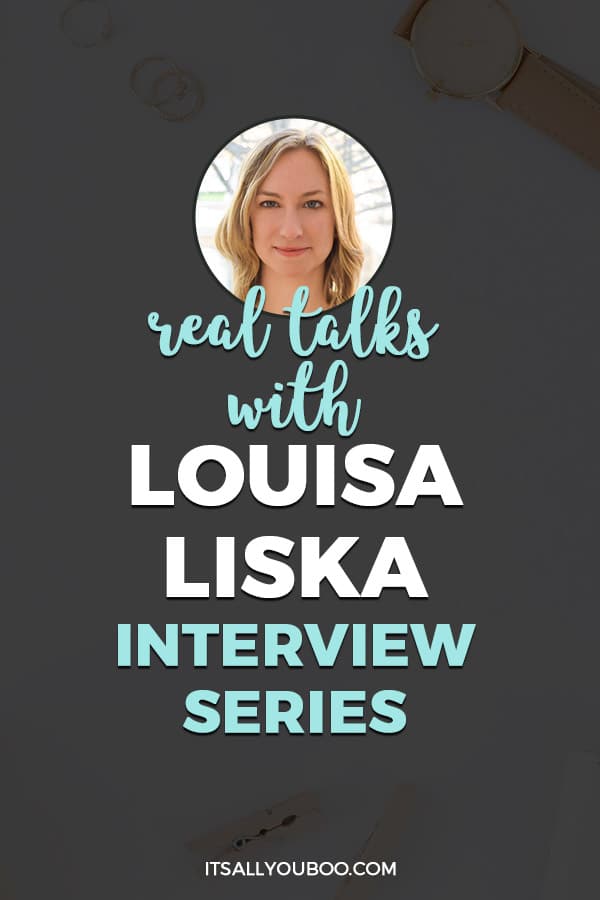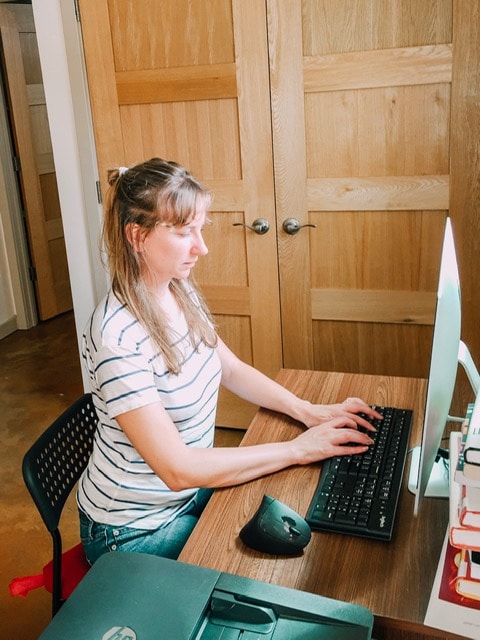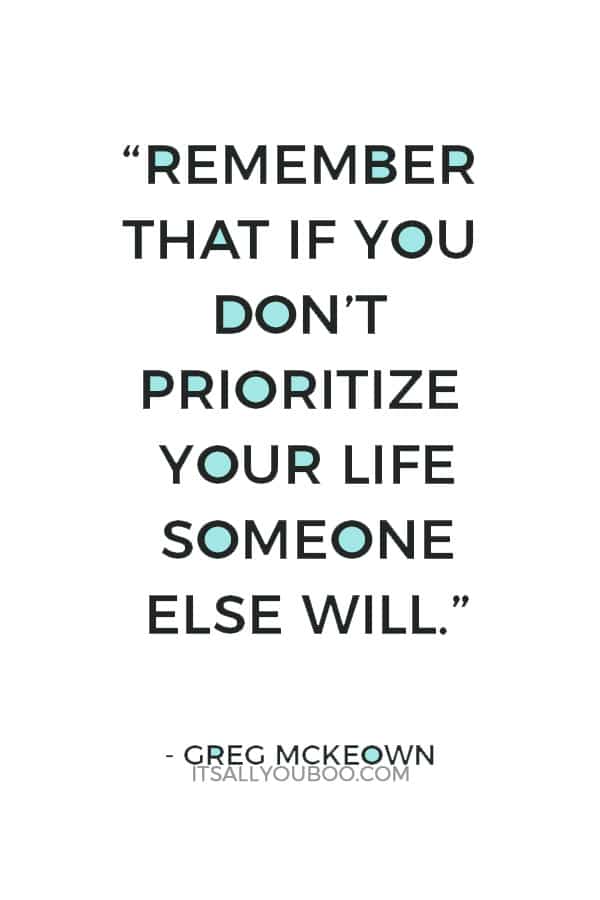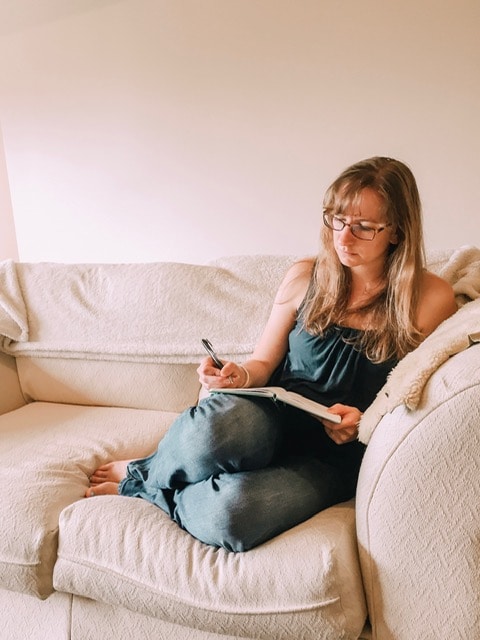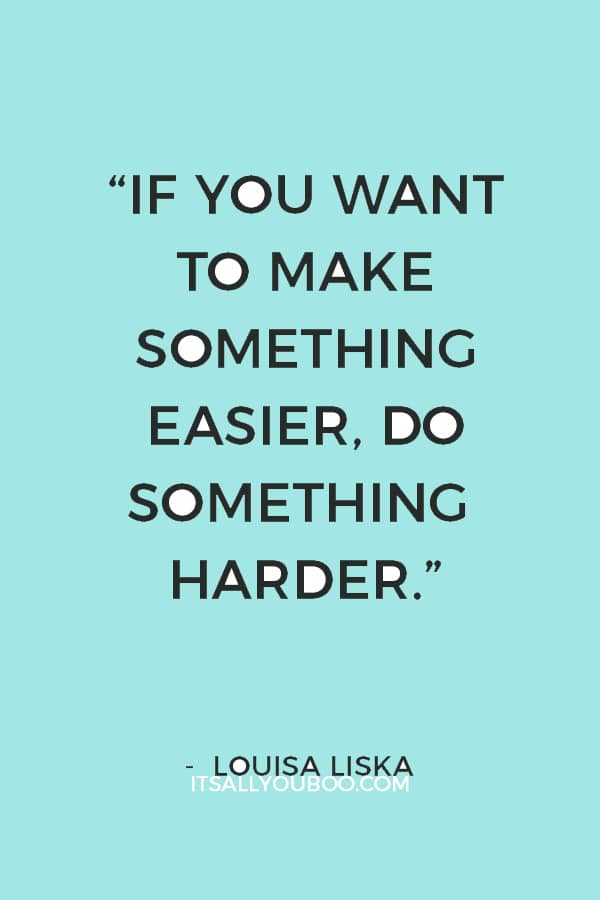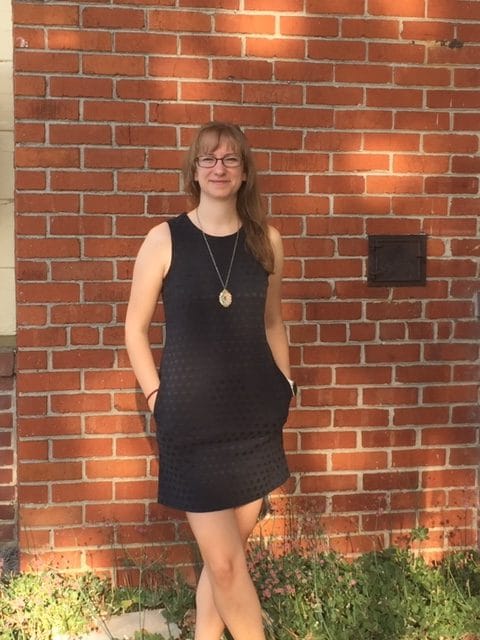What’s it like working full-time and being a blogger?
Thinking about starting a blog, without quitting your job?
You’ve heard about all these successful bloggers who are running successful and profitable blogs, like Marina Lotiaf of Yes To Tech or Arfa of She Means Blogging.
But, you actually enjoy your job and don’t want to quit your day job. For you, blogging could be a side-hustle or passion project.
If you’re interested in learning how to balance having a part-time blog and a full-time job, then this is the interview for you. Especially, if you’re interested in finding ways to manage your time and balance your passions with your professional life. Louisa Liska works full-time in a busy industry, while also blogging on the side helping people actually get things done.
Plus, Louisa has mastered the art of maximizing your time, creating systems that work, and finding ways to have a busy but peaceful life. If you’re struggling with feeling overwhelmed in your work life, then you’ll learn so much from this interview as well.
Let’s get started.
#1. Who are you and what’s your story?
Hi, I’m Louisa! I help people organize their time in order to avoid burnout and live a meaningful life.
My approach to this comes from my own journey. I am the General Manager of a major non-profit regional theater. I am passionate about my career and have always taken it very seriously. In undergrad, I studied it, had an internship lined up right after college, and I went to graduate school at the Yale School of Drama to fully learn my profession.
But in my first job after graduate school, I realized that my skills and knowledge were only one part of the picture. Working in a non-profit means achieving big dreams on a shoestring budget. Especially in the world of theater, there are endless creative aspirations, and only so many resources to achieve them.
👉🏽 RELATED POST: Should I follow my dreams or be realistic?
I started to feel like it wasn’t enough
I tried to fill the gap between these two things with sheer willpower. But, I skipped lunch most days, feeling unable to step away for fear of getting behind. I stayed late at work, often pushing through by eating a candy bar and a bag of chips to keep me going. Plus, I constantly hustled to stay ahead until one day I made a mistake on a project and I hit a wall. I was devasted. I felt like I was doing everything I could possibly do and it still wasn’t enough.
A couple of months afterward were not a pretty time for me. I didn’t know what to do and couldn’t find any motivation. But after a little while, I started to reach for some new ideas to help me recenter myself. I realized I had been putting all of my stock in my career and I was letting it define my identity.
I realized I was more than my job
I started to shift my focus from an endless pursuit of achieving more to a pursuit of feeling more of the way I wanted to feel each day. By doing this I started to see the big picture again. Instead of feeling stuck in the day to day details, I could clearly see what really mattered to me and my company and design systems to help prioritize those things.
Since then, I have fine-tuned my personal productivity process and developed countless other systems for my company and teams. In each case, my goal is to take a problem, break it down into its components, and automate everything I can, so my focus can go 100% into creating quality work.
👉🏽 RELATED POST: How to Deal With Overwhelm At Work and In Your Life
I realized that I had hit upon some strategies that can help others as well and I created my blog, The Actually to share them. The Actually is a resource for real people that want to spend more of their time doing meaningful activities.
There’s a lot of productivity advice out there where there is one perfect way to do something…and those methods are often incompatible with most people’s lives, which are inherently messy and complicated.
I focus on building blocks that can be arranged to uniquely support anyone’s specific situation. I also believe that your productivity does not determine your self-worth. Productivity is a tool for good, but it is not the end goal. The end goal is a meaningful life, and you get to define what that looks like.
#2. What’s your average day like?
Since I still have a full-time job, I have to be very strategic about my time to also work on my business. I usually wake up at 7 am, I write for twenty minutes, and then I work on one or two big key tasks before I go to work at 9 am.
Then, I commute to work on public transit and use that time to read or brainstorm ideas. I usually get home around 7:30 pm and do some kind of workout. In the evening, I then try to complete another key task for the blog.
👉🏽 RELATED POST: How to Prioritize Your Time at Work and Home
I keep Tuesday nights as completely work-free nights. This is really important for me to recharge and not get burned out during the week. My weekends are my golden time to get big chunks of work done. I save larger projects that need sustained focus for those times.
While I love having a routine, the nature of my job often means commitments outside of regular work hours, so I stay flexible and fluid. Some mornings I have to be at work for an early meeting, so my routine is off. Or I may have an evening event that takes my night. Before the week starts, I identity all of my commitments and then plan my work around that.
#3. How do you stay motivated? What or who inspires you?
Curiosity and love of learning are my greatest motivators. As long as I am growing and learning in my work, I have a strong internal motivation that helps me to keep showing up, day after day. I also believe in the work that I am doing – I think there is so much value in more people being happy and fulfilled in their work lives.
There are tools and strategies that can be the difference between being on the edge of burnout and being lit up and excited to go to work every day. The more people who feel lit up in their daily lives, the better a world it is.
👉🏽 RELATED POST: How to Get Motivated
#4. Let’s talk about goals. How do you slay yours?
Be choosy about your goals. Slaying a goal requires an investment of time, energy, and attention to do it right. One way to think about this is to approach your goals like you would a serious relationship. Date around for a bit and get to know them before you make a long-term commitment.
There are an endless amount of goals you could pick out there, but a limited amount of things you can actually accomplish. So it’s okay to be a bit picky. Once you’ve spent some time with a goal and decided that it’s the one, it’s time to commit and go all-in on it.
👉🏽 RELATED POST: How to Have a Goal Setting Retreat
The first step I take is to break a goal into smaller components. At the start, I will brainstorm everything I can think of that is needed to accomplish the goal. From that initial list, I focus on items that are actionable and in my control.
I break this list down into three types of activities:
- Daily or weekly activities that can become habits
- One-time tactics or projects needed to complete the goal
- Actions that can be automated or streamlined in support of the goal
Within each list, I prioritize actions that will give me the best return. If two things seem about equal, or I’m not quite sure what will be best, I’ll prioritize what I can do most easily. Then I map out a timeline for completion and give each action a rough deadline.
👉🏽 RELATED POST: 6 Steps to Setting Achievable Goals
My approach to goal setting is not a one and done kind of activity. It is an iterative process, which means I set a path, get some initial data on how it is going, and then I adjust the path in response to any new information. I set regular intervals to check in on my goals, so I am not shifting haphazardly, but I am thoughtfully reviewing my progress and making intentional course corrections.
#5. What’s one app or tool that you can’t do without?
This is so basic, but the notes app on my phone is probably the most important tool for my blog. I write about my real-life professional experiences, so I am constantly having “ah ha” moments throughout my day.
It’s important for me to capture those somewhere right away, so I can dig in deeper later. I have about twenty different folders in my Notes app and store all of these insights there – anything from stories that I hear to ideas for an article to a problem that I frequently run into that I know might resonate with others.
#6. What’s your favorite and least favorite part of being an entrepreneur?
At the risk of sounding like a total control freak, I love getting to make all the decisions. It’s really rewarding for me to have an idea and be able to make it happen. Sometimes it works out great and I feel like a rockstar, and sometimes it totally falls flat.
So perhaps the hardest part has been also learning to not grow too attached to any one idea and have the humility to stay flexible and make changes.
👉🏽 RELATED POST: How to Accept that Your Goals Has Changed
#7. What advice would you give to someone just starting out?
My advice is to not always listen to other people’s advice. Haha. More specifically, there are so many opinions out there about the best way to be an entrepreneur and blogger and it is easy to get overwhelmed or end up replicating a business that doesn’t really serve your vision and customers.
I would recommend taking in the advice of others, picking a couple of priorities that best serve your customers, and then stick to your plan. You won’t know if something works until you try it, and it can take some time to see results. Stay flexible, but make changes from a place of confidence instead of from a place of fear.
#8. What’s the best business advice you’ve ever received?
I really love the book Essentialism by Greg McKeown. The crux of the book is: “Do less, but better”. This is easier said than done because it takes a lot of courage and discipline to do less. But when you can stick to it, this helps you focus your efforts on a handful of specific things, rather than trying to do everything all the time. That level of focus usually leads to a much greater return, as opposed to dabbling in something where results are fairly minimal.
👉🏽 RELATED POST: 100 Best Personal Development Books
#9. What books do you think every entrepreneur should read?
Some specific books I recommend are “Essentialism”, “I Know How She Does It” and “Building a Story Brand” and I talk about who should reach each of these books in a post here, 5 Books You Need to Read.
But beyond specific titles, I recommend a regular practice of reading. Especially if you are a blogger, reading regularly is one of the best ways to spark your imagination and improve your writing. For courses, I am currently working my way through the Elite Blog Academy course. It is very comprehensive so has been a great tool for staying focused and taking my blog development one step at a time.
I also recommend Nadalie’s Pinterest Popular course. I was super intimidated by Pinterest before taking this course and couldn’t wrap my head around how to leverage it without spending all of my time pinning. One of my philosophies around productivity is to create systems to automate as much of your work as possible, and Nadalie’s course gives some great tools to do that.
#10. Do you have a favorite quote or saying?
Yes, two come to mind right now. First, “Work slowly to work well” and second, “If you want to make something easier, do something harder”.
“Work slowly to work well” came to me as a saying one day when I was feeling very overwhelmed at work. I had a huge to-do list and wanted to find a way to feel more peaceful about it. Now I say those words to myself all the time. I’m a bit of an impatient person and when I’m passionate about something, I like to dive in 100%. So “Work slowly to work well” reminds me to take a breath and focus on the work that is in front of me at that moment.
“If you want to make something easier, do something harder” came to me when I was training for a half-marathon. I used to majorly struggle with running and when I first started training, a three-mile run seemed basically impossible. As I started to run longer and longer, I realized that my three-mile run days had become my easy days! It was such an incredible reminder that whatever I am finding hard right now, can someday become easy if I keep working on it and developing my skills.
#11. Can we talk about money?
Sure! My blog is not profitable yet. I want to create a strong foundation for my business, so am focusing on foundational activities for the moment, with the intention that real monetization will come later.
I am fortunate that my full-time job supports me so I don’t have to put pressure on my blog. Even so, to be honest, it can be scary to invest money and time into something that doesn’t yet have an immediate payoff. I overcome that fear in two ways:
#1. I’m thoughtful when investing in tools.
The great thing about blogging is that the overhead is fairly low, and the most significant investment is your time. I will spend money on tools or classes that I think can support me in the phase of blogging I am in, but I try not to be “purchase happy” about it. When there is uncertainty in a business venture, buying a new tool or course can feel good, because it seems like you are taking action. And sometimes, it really is the best action you can take, but it’s always good to second guess your motivations before clicking that “Buy Now” button.
👉🏽 RELATED POST: Best Business Tools for Beginner Bloggers
#2. I measure success by motivation, not money
I measure my success against how much I am fulfilling my personal motivation of curiosity and learning and my bigger motivation of helping more people to be happier at work. Financial success is absolutely important for anyone trying to run a business, so should not be ignored. But because I know it takes time to build momentum, I focus on these other aspects instead of just prioritizing revenue.
#12. What’s your strategy for finding clients or readers?
My strategy is a mix of social media and publicity. I have shifted my focus from chasing page numbers or metrics that are somewhat out of my control, to breaking down the activities I need to do each week and measuring my output. I pay attention to what is working and make adjustments as needed.
#13. What role does social media play for you?
Social media plays a role in generating traffic, generating awareness, and building relationships. I have different levels of success in each of these goals in different social media channels.
Pinterest and Facebook are the best at generating traffic, Instagram, and LinkedIn (since my audience is full of business professionals) are best for generating awareness, and Instagram and Twitter are best for building relationships with other bloggers and writers.
👉🏽 RELATED POST: How to Create a Social Media Strategy
#14. Do you have a special offer you’d like us to know about?
Yes! I have a productivity blueprint to help you get sh*t done.
If the thought of being productive and organized gives you anxiety, I encourage you to push through that and give this a try. The whole point is that you put in some effort now so you actually don’t have to think that much about being organized later.
This is a great first step in automating your work so you can put your energy into what really matters for your business.
THIS POST MAY CONTAIN AFFILIATE LINKS.
IF YOU MAKE A PURCHASE FROM THESE LINKS, I MAY EARN A SMALL COMMISSION.
CLICK HERE FOR MY FULL DISCLAIMER STATEMENT.
Bonus Questions!
Quickly tell us about yourself and what you’re currently:
- Reading? “When” by Daniel H. Pink
- Watching? The Witcher on Netflix
- Listening to? I’m a musical theater girl, so I usually have some musical theater recording in my regular playlist. I also really like the podcast “Building a StoryBrand” and “Do It Scared with Ruth Soukup”.
- Eating? Nachos. Always nachos.
- Obsessed with? Oat Milk Lattes.

More About Guest Contributor
Louisa Liska helps people who are passionate about their careers manage their productivity and mindset in order to avoid burnout. Visit her at theactually.com for her free guide to creating an organization system to get things done while keeping a peaceful mind.
Last Updated on August 8, 2024
